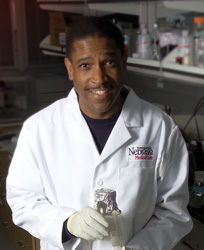 |
With a UNMC doctorate in hand, LeDon Bean, Ph.D., begins his new post-doc research position at Washington University in St. Louis. |
That desire led him to initiate the annual “Stepping Forward and Reaching Back” program in 1999 to encourage students to seek higher degrees in math and science.
His love of mentoring spread to other minority professionals who were asked to participate in his program. He hoped the experience would make a difference.
“I wanted to expose our youth to students in pursuit of their professional goals as well as professionals from all walks of life including science, engineering, law, and politics, who occasionally have had to work harder than most for their education,” Bean said.
The program, sponsored by UNMC’s Office of Student Equity and Multicultural Affairs (OSEMA), touched the lives of hundreds of middle and high school students from North Omaha for the past seven years.
Now the program may end as Dr. Bean strides, with doctorate in hand, to his new post-doc research position at Washington University in St. Louis.
Curiosity and compassion — two characteristics ingrained in Dr. Bean since youth — are what he tried to pass on to the young students he met through his and various summer research programs on campus.
He told them about seizing opportunities in the present and being responsible to family and career.
“Our centers of education are beacons of opportunity for our youth. We need to give them a variety of reasons to come on campus,” Dr. Bean said. “Every act of concern, every minority faculty member, student or administrator they meet on campus, is another affirming incentive for our youth to believe that they can achieve their goals as well.”
Although he has not followed every student who participated in his program, Dr. Bean knows some who are now attending various colleges and universities and he is aware of at least one student planning to attend UNMC this fall.
“It’s wonderful to know that what I’ve done has had some benefit,” he said.
As a child, Dr. Bean spent many hours on the University of Southern California campus, which was next door to his grandparent’s house.
“I was just a child, but I read in the university’s library, played football on the field and even saw movies on campus. Everyone welcomed me. No one turned me away,” Dr. Bean said.
So naturally, that’s the college he chose and in 1994 graduated with a degree in chemistry. He came to Omaha to attend Creighton University, which at the time had a special program to encourage minorities to enter medical school. But the program dissolved, leaving Dr. Bean looking for options.
He transferred to the University of Nebraska at Omaha to pursue a master’s degree in biological sciences with an emphasis in physiology. The majority of his courses were offered at UNMC, which initiated his eventual pursuit of a doctoral education with a neuroscience emphasize.
“I initially wanted to pursue medicine as a physician, however, I am now engaging medicine as a neuroscience researcher,” Dr. Bean said. “A lesson I attempt to instill in our youth is that through education a variety of avenues can be traveled and that the goal is to have strategies for success and goals for accomplishments.”
His time at UNMC has been spent researching the effects of diabetes on the brain, primarily how N-Methyl-D-Aspartate (NMDA) receptors act in rats with Type I diabetes.
“These receptors are involved with many brain functions, such as hypothalamus regulation, cell migration and synaptic formation, and they’re also involved with learning and memory,” said Dr. Bean, who works with Daniel Monaghan, Ph.D., professor of pharmacology and experimental neuroscience, and director of the biomedical research training program.
As part of his research, he was first author of an article that appeared in the Oct. 18, 2006, edition of Brain Research, contributed to a chapter in a book on neuroscience, published abstracts and presented his research at international conferences. He also has represented UNMC at various multicultural conferences.
But, as life goes, it’s now time to move on. At Washington University, where he began July 2, Dr. Bean will continue to study NMDA receptors as part of a research project in the department of psychiatry. He says he’ll probably become involved in community outreach programs at his new home campus.
His dedication to reaching back and role modeling for others in the Omaha minority community was truly appreciated and will be missed, said Mary McNamee, Ph.D., assistant vice chancellor for academic affairs and director of OSEMA.
“LeDon is a rare human being. Although heavily involved in his doctoral program classes and research, he never forgot where and when he got ‘turned on to science.’ He taught us all that there are many ways of giving back to the community,” Dr. McNamee said.